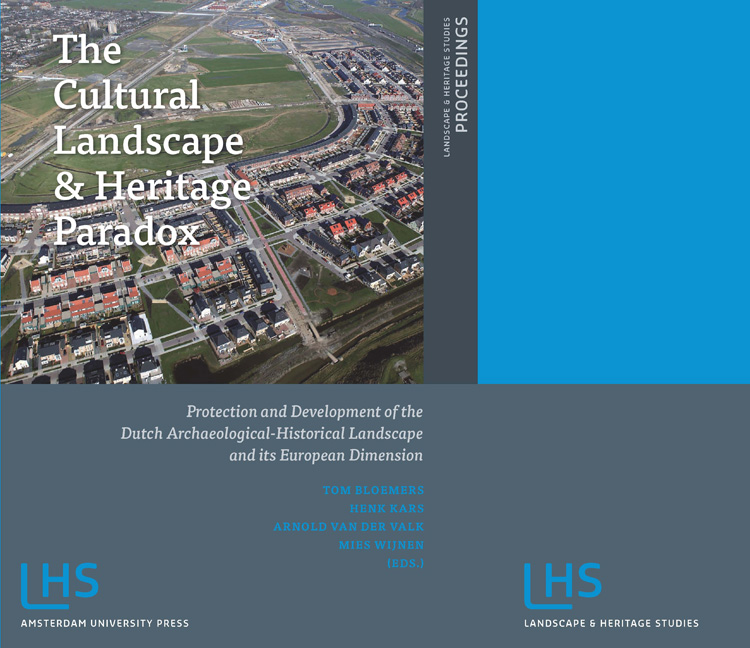 The Cultural Landscape and Heritage Paradox
The Cultural Landscape and Heritage Paradox Book contents
- Frontmatter
- Contents
- Preface
- I INTRODUCTION
- II INSIGHTS AND PROSPECTS OF ARCHAEOLOGICAL-HISTORICAL LANDSCAPE STUDIES
- III LINKING KNOWLEDGE AND ACTION
- IV IMAGINATION - FACTS AND CONSTRUCTIONS
- V SHARING KNOWLEDGE - STORIES, MAPS AND DESIGN
- VI SYNTHESIS AND CONCLUSIONS
- VII MANAGEMENT OF KNOWLEDGE
- VIII AGENDA FOR THE FUTURE
- IX SUMMARY
- X APPENDIX
- Subject Index
- Index of Places and Regions
2 - Elephant and Delta. In search of Practical Guidelines for Interdisciplinary and Strategic Research
Published online by Cambridge University Press: 21 January 2021
- Frontmatter
- Contents
- Preface
- I INTRODUCTION
- II INSIGHTS AND PROSPECTS OF ARCHAEOLOGICAL-HISTORICAL LANDSCAPE STUDIES
- III LINKING KNOWLEDGE AND ACTION
- IV IMAGINATION - FACTS AND CONSTRUCTIONS
- V SHARING KNOWLEDGE - STORIES, MAPS AND DESIGN
- VI SYNTHESIS AND CONCLUSIONS
- VII MANAGEMENT OF KNOWLEDGE
- VIII AGENDA FOR THE FUTURE
- IX SUMMARY
- X APPENDIX
- Subject Index
- Index of Places and Regions
Summary
It was six men of Indostan
To learning much inclined,
Who went to see the Elephant
(Though all of them were blind),
That each by observation
Might satisfy his mind.
John Godfrey Saxe (1816-1887)ABSTRACT
This paper is about co-operation between practitioners of various disciplines in the humanities, natural sciences and social sciences. The author explores the intricacies of integrative research, building upon his personal experience. First he analyses three cases selected more or less arbitrarily from Dutch planning practice because they were well documented and seemed promising since by 2003 they showed analogies with the emerging Protecting and Developing Programme. The cases provide building blocks for a provisional middle range action theory for the direction of interdisciplinary research. The building blocks are compared to lessons learned and recommendations produced by researchers of practices in contemporary interdisciplinary research associated with the Wageningen Delta Programme for Integrative Landscape Research (1999-2004). The author was its research leader. The lessons from the Delta Programme are both positive and negative. Lessons are compared with experiences by Fry and others in the field of landscape research. The author deduces tentative guidelines which have been a source of inspiration for the leadership of the PDL/BBO programme between 2003 and 2010.
KEY WORDS
Multi-disciplinarity, interdisciplinarity, transdisciplinarity; integrative landscape research, best practices, strategic research
INTRODUCTION
A popular Dutch saying has it that two heads are better than one. Unfortunately, this does not always apply to science. The situation in scientific research all too often shows more similarity with an old Indian fable in which six blind men investigate the phenomenon which people who can see refer to as an ‘elephant’.
The blind men jointly investigate something which for them is an abstraction. They are keen to explore an elephant by getting in touch with it, literally, thus collecting empirical evidence for its existence. They hear that the thing is standing in front of them and take turns exploring the contours. The first blind man walks forward, stumbles and falls against the flank of the animal. He observes that the elephant is solid and hard like a wall. The second blind man investigates the front of the animal and grasps the tip of the tusk. He is convinced that the elephant is to be associated with a spear. The third blind man touches the coiling trunk.
- Type
- Chapter
- Information
- The Cultural Landscape and Heritage ParadoxProtection and Development of the Dutch Archaeological-Historical Landscape and its European Dimension, pp. 529 - 544Publisher: Amsterdam University PressPrint publication year: 2010


